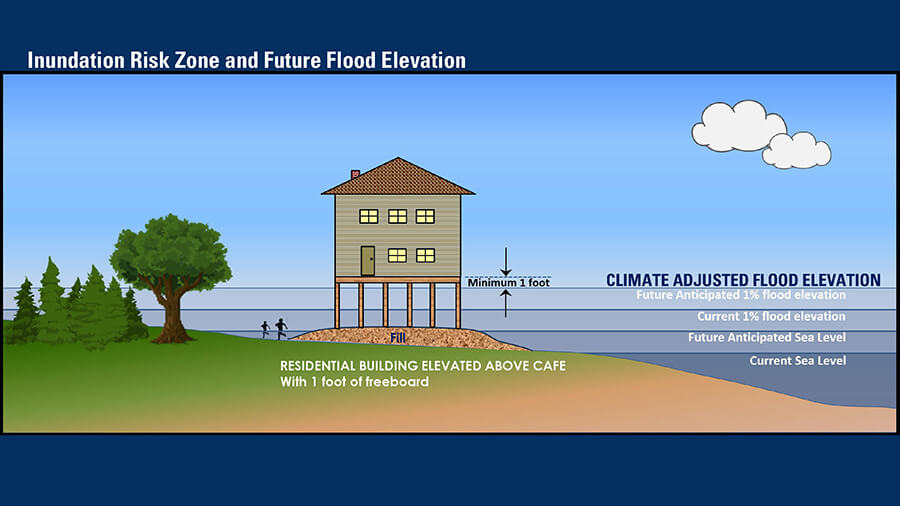Cape May County and its towns have united in their opposition to newly proposed state rules on coastal development and are asking Gov. Phil Murphy to slow down on changes.
A resolution sent to the governor on behalf of the county and all 16 of its municipalities also asks that the Legislature be engaged in such changes rather than have them become law by executive order.
The new regulations, known as the Resilient Environments and Landscapes (REAL) rules and formally proposed by the Department of Environmental Protection Aug. 5, make changes across a broad swath of existing land use and water management regulations that will present serious and, according to the joint resolution, “unnecessary” barriers and hardships to Shore community development.
Among the major changes is the creation of a new “inundation zone,” which takes land currently above sea level and places it in a zone that the scientific research adopted by the DEP says will be inundated permanently or twice daily during high tides within the 76-year planning horizon of the regulations.
The regulations would adjust the tidal flood hazard zone area to reflect a DEP expectation of a 5-foot rise in the sea level by the year 2100. Regulations on stormwater management, freshwater wetlands and coastal zone management are all affected.
The proposed rules also establish a new Climate Adjusted Flood Elevation level that adds 5 feet to FEMA’s 100-year flood-elevation level. New development in 2024 must accommodate an expected flood elevation level based on projections of the sea level 76 years in the future.
County Commissioner Director Len Desiderio said in a press release, “My fellow county commissioners and I acknowledge the importance of good environmental policy, and our county and its municipalities continue to practice coastal resiliency and the highest degree of floodplain management in all public planning and infrastructure projects.
“However, the REAL rules, based on sea level rise projections for the year 2100 with a less than 17% probability of occurring are too much too quickly, and the unknown economic impacts are too great of a concern for our county taxpayers.”
The press release encourages county residents to participate in the public comment period on the newly proposed rules, which runs until Nov. 3. The DEP published the rules in the New Jersey Register on Aug. 5, starting the clock running on the public comment period.
County officials see the new regulations as dangerous to the economy and way of life of coastal communities. They also see aspects of the rules they feel were unnecessary and designed not just to protect the coast but to drive a retreat from the Shore.
Prior to the publication of the rules, the county engaged the Lomax Environmental Consulting group to present a report on the more than 1,000-page compendium of regulations. A goal was to provide the municipalities and the public with an accessible understanding of what the state is proposing.
In addition, the county developed a model resolution outlining the county’s formal comment on the regulations. That resolution was then circulated to each of the 16 municipalities with the suggestion that it be reviewed by the governing bodies and adjusted in any way that made sense for the specific municipality.
That process resulted in the unified position by the county and municipal governments. Resolutions of opposition to the DEP regulations have been adopted by all 16 towns.
The collective county position is that the new regulations would unnecessarily increase construction costs for public and private projects countywide, would distress low- and moderate-income families and would hamper the development of low-income housing.
The concerns extend to their impact on the fishing industry, compliance standards for historic structures and the shrinking of the amount of developable land.
A bottom-line position for county officials is the harm they believe these regulations would do to the tourist economy upon which so much of the county depends.
“With a tourism industry responsible for providing over 40,000 jobs, greater than $635 million in state tourism tax revenues, and $50 billion in net ratables, Cape May County and its municipalities have growing concerns regarding the impacts these REAL rules will have on the economy, and the potential distress it may cause for residents living and working in Cape May County,” Desiderio’s press release said.
The county and the municipalities are calling for a more incremental approach to rule-making with planning horizons more appropriate to current development projects. The resolutions adopted by each town call for engaging in a legislative approach to the response to climate change.
They seek the involvement of the “people voted in to serve their best interests, rather than approving these rules into law by way of executive order.”
County officials have registered to participate in an in-person public hearing on the new regulations on Sept. 5 at 6 p.m. at Ocean County College in Toms River.
Two virtual hearings will also be available for remote public participation. They are on Thursday, Sept. 12, at 2 p.m. and Thursday, Sept. 19, at 10 a.m.
Residents can also submit comments electronically and via U.S. mail.
Information on how to comment, when and how to participate in the hearings, and access to a copy of the proposed regulations is available here.
A copy of the county resolution, its press release and other information on the county position is available here.








